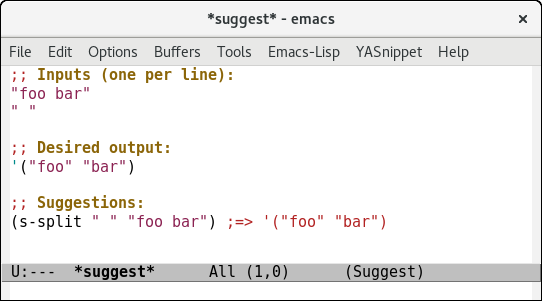Wilfred / Suggest.el
Labels
Projects that are alternatives of or similar to Suggest.el
suggest.el
suggest.el is an Emacs package for discovering elisp functions based on examples. You supply an example input and output, and it makes suggestions.
Interested readers may enjoy my blog posts:
Examples
suggest.el knows many string functions:
;; Inputs (one per line):
"foo bar"
;; Desired output:
"Foo Bar"
;; Suggestions:
(capitalize "foo bar") ;=> "Foo Bar"
suggest.el can also help you find tricky dash.el functions:
;; Inputs (one per line):
(list 'a 'b 'c 'd)
'c
;; Desired output:
2
;; Suggestions:
(-elem-index 'c (list 'a 'b 'c 'd)) ;=> 2
suggest.el is particularly handy for path manipulation, using both built-in functions as well as f.el:
;; Inputs (one per line):
"/foo/bar/baz.txt"
;; Desired output:
"baz.txt"
;; Suggestions:
(file-name-nondirectory "/foo/bar/baz.txt") ;=> "baz.txt"
(f-filename "/foo/bar/baz.txt") ;=> "baz.txt"
It can even suggest calling functions with apply:
;; Inputs (one per line):
'(1 2 3 4 5)
;; Desired output:
15
;; Suggestions:
(-sum '(1 2 3 4 5)) ;=> 15
(apply #'+ '(1 2 3 4 5)) ;=> 15
It can also suggest composing functions:
;; Inputs (one per line):
'(a b c)
;; Desired output:
'c
;; Suggestions:
(cadr (cdr '(a b c))) ;=> 'c
(car (last '(a b c))) ;=> 'c
(cl-third '(a b c)) ;=> 'c
It will also suggest additional arguments of basic values (0 in this example):
;; Inputs (one per line):
'(a b c d)
;; Desired output:
'a
;; Suggestions:
(elt '(a b c d) 0) ;=> 'a
(nth 0 '(a b c d)) ;=> 'a
(car '(a b c d)) ;=> 'a
(cl-first '(a b c d)) ;=> 'a
(-first-item '(a b c d)) ;=> 'a
How it works
suggest.el uses enumerative program synthesis. It tries your inputs
(in any order) against every function in suggest-functions.
suggest-functions is a carefully chosen function list: they're all
pure functions with a small number of arguments using only simple data
types. We only include functions that users could 'stumble upon' with
the right set of inputs.
Contributing
To work on the code, clone the repo, then you can eval suggest.el in your current Emacs instance.
To run the tests, you will need Cask. Once you've installed Cask, you can install the suggest.el dependencies and run the tests as follows:
$ cask
$ cask exec ert-runner
License
GPLv3.
Related projects
Program synthesis or inductive programming is a computer science research topic, with a range of tools taking very different approaches to generate code.
Smalltalk: Finder
This project was inspired by the Finder in Smalltalk, which does something similar. There's a great demo video here.
You give a list of values (inputs followed by an output):
3. 4. 7.
The Finder iterates over all possible calls (with arguments in any order) to a list of known safe messages, and returns suggestions:
3 + 4 --> 7
3 bitOr: 4 --> 7
3 bitXor: 4 --> 7
3 | 4 --> 7
This only returns single messages that meet the requirements, no
nesting (e.g. it won't find '(data1 reversed asUppercase)' from
'foo'. 'OOF').
You can also supply multiple examples, using expressions as inputs:
MethodFinder methodFor: { {'29 Apr 1999' asDate}. 'Thursday'.
{'30 Apr 1999' asDate}. 'Friday' }.
This returns '(data1 weekday)'.
Amusingly, it will sometimes find '(data1 shuffled)' from
'fo'. 'of'., which is a random sort.
Python: cant
There are some other niche tools that take other approaches. For example, cant for Python tries every function in scope (without a safety whitelist) to find functionality.
Scheme: barliman
barliman takes this idea of synthesis much, much further for Scheme. There's an incredible demo video here.
C-like: sketch
sketch allows the user to specify value placeholders in code (examples).
harness void doubleSketch(int x){
int t = x * ??;
assert t == x + x;
}
Generally you provide the structure of the code.
bit[W] firstLeadingZeroSketch (bit[W] x) implements firstLeadingZero {
return !(x + ??) & (x + ??);
}
Or you can specify a set of operators for sketch to explore. Each line
here is an assignment to x or tmp of an expression that may
contain ! & + with x, tmp or a constant as arguments.
bit[W] firstLeadingZeroSketch (bit[W] x) implements firstLeadingZero {
bit[W] tmp=0;
{| x | tmp |} = {| (!)?((x | tmp) (& | +) (x | tmp | ??)) |};
{| x | tmp |} = {| (!)?((x | tmp) (& | +) (x | tmp | ??)) |};
{| x | tmp |} = {| (!)?((x | tmp) (& | +) (x | tmp | ??)) |};
return tmp;
}
Constraints are fed to a SAT solver, then sketch finds a solution. The output can be converted to C.
Liquid Haskell: Synquid
Synquid (the first half of this Microsoft Research talk gives a good overview) is a program synthesis tool leveraging refinement types.
The user provides the type of the function they want to generate, and a collection of 'components', the building blocks that Synquid tries to combine.
Synquid then lazily generates ASTs and type checks them. This allows it to prune the search tree by ignoring program structures that are never valid types.
(This is the extent of my understanding: I have probably oversimplified.)
Impressively, Synquid can generate recursive functions.

